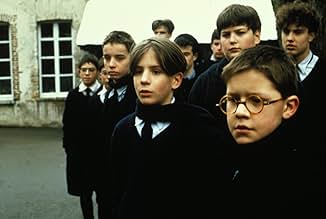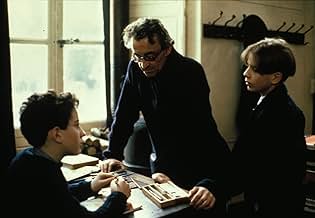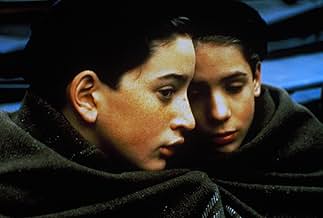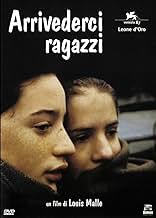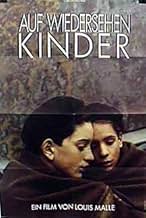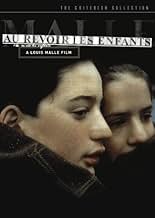IMDb RATING
8.0/10
38K
YOUR RATING
A French boarding school run by priests seems to be a haven from World War II until a new student arrives. Occupying the next bed in the dormitory to the top student in his class, the two yo... Read allA French boarding school run by priests seems to be a haven from World War II until a new student arrives. Occupying the next bed in the dormitory to the top student in his class, the two young boys begin to form a bond.A French boarding school run by priests seems to be a haven from World War II until a new student arrives. Occupying the next bed in the dormitory to the top student in his class, the two young boys begin to form a bond.
- Nominated for 2 Oscars
- 28 wins & 12 nominations total
Stanislas Carré de Malberg
- François Quentin
- (as Stanislas Carré De Malberg)
Luc Etienne
- Moreau
- (as Luc Étienne)
- Director
- Writer
- All cast & crew
- Production, box office & more at IMDbPro
8.038K
1
2
3
4
5
6
7
8
9
10
Featured reviews
child's memory of occupation
After a few years making movies in the United States, Louis Malle returned to his native France and made "Au revoir les enfants", based on his memories of growing up in Nazi-occupied France. The movie focuses on the friendship between two boys in a Carmelite boarding school, one of whom is keeping his real identity secret.
A particularly effective scene is in the restaurant. There are some Wehrmacht officers at a table, but they keep to themselves. Then the Milice enters and orders a Jewish patron out of the restaurant. The Wehrmacht officers then order the Milice to leave. This emphasizes not only the role of the Vichy government, but also the role of the collaborators in every country that Germany occupied.
I haven't seen all of Malle's movies, but this is probably the best of his movies that I've seen. The final scene has to be one of the most chilling in cinema history. I recommend the movie.
A particularly effective scene is in the restaurant. There are some Wehrmacht officers at a table, but they keep to themselves. Then the Milice enters and orders a Jewish patron out of the restaurant. The Wehrmacht officers then order the Milice to leave. This emphasizes not only the role of the Vichy government, but also the role of the collaborators in every country that Germany occupied.
I haven't seen all of Malle's movies, but this is probably the best of his movies that I've seen. The final scene has to be one of the most chilling in cinema history. I recommend the movie.
Friendship and Betrayal in Times of War
In 1944, the upper class boy Julien Quentin (Gaspard Manesse) and his older brother François travel to the Catholic boarding school in the countryside after vacations. Julien is a leader and good student and when the new student Jean Bonnet (Raphael Fejtö) arrives in the school, they have friction in their relationship.
However, Julien learns to respect Jean and discovers that he is Jewish and the priests are hiding him from the Nazis. They become best friends and Julien keeps the secret of the origins of Jean. When the priest Jean (Philippe Morier- Genoud) discovers that the servant Joseph (François Négret) is stealing supplies from the school to sell in the black market, he fires the youth. Sooner the Gestapo arrives at school to investigate the students and the priests that run and work in the boarding school.
"Au Revoir les Enfants" is an awarded film written and directed by Louis Malle apparently based on true events during World War II in the boarding school where he studied. The touching story of friendship and betrayal is beautiful and sad, and the boys have great performances. Louis Malle highlights the despicable behavior of collaborators and traitor and the most impressive, the German soldiers are tough but respectful with the French civilians. My vote is eight.
Title (Brazil): "Adeus, Meninos" ("Goodbye, Boys")
However, Julien learns to respect Jean and discovers that he is Jewish and the priests are hiding him from the Nazis. They become best friends and Julien keeps the secret of the origins of Jean. When the priest Jean (Philippe Morier- Genoud) discovers that the servant Joseph (François Négret) is stealing supplies from the school to sell in the black market, he fires the youth. Sooner the Gestapo arrives at school to investigate the students and the priests that run and work in the boarding school.
"Au Revoir les Enfants" is an awarded film written and directed by Louis Malle apparently based on true events during World War II in the boarding school where he studied. The touching story of friendship and betrayal is beautiful and sad, and the boys have great performances. Louis Malle highlights the despicable behavior of collaborators and traitor and the most impressive, the German soldiers are tough but respectful with the French civilians. My vote is eight.
Title (Brazil): "Adeus, Meninos" ("Goodbye, Boys")
The subtle and not subtle anti-Semitism through the eyes of a French boys boarding school
Au Revoir Les Enfants (1987)
A wrenching, sensitive, all-too-true drama set in a gorgeous French wooded outpost during World War II. The main actors are boys, and they play their parts with unusual conviction, unexaggerated but with intensity. And the anti-Semitism that arises, though inevitable in Nazi territory, comes subtly and really stings. The movie isn't complete without this horror, but the horror is made complete by the really vivid recreation of this kind of private boys school--a period movie at its best.
Director Louis Malle has not only a message, but a sensitive feel for the medium--for making fluid the flow and background of the plots of his films. It's also a fairly complex mix of types, and you can somehow keep them all straight as it goes--as straight as you are meant to as the facts unfold. In the end, it confirms a familiar story of Nazi terror, but one that can't be told too often.
A wrenching, sensitive, all-too-true drama set in a gorgeous French wooded outpost during World War II. The main actors are boys, and they play their parts with unusual conviction, unexaggerated but with intensity. And the anti-Semitism that arises, though inevitable in Nazi territory, comes subtly and really stings. The movie isn't complete without this horror, but the horror is made complete by the really vivid recreation of this kind of private boys school--a period movie at its best.
Director Louis Malle has not only a message, but a sensitive feel for the medium--for making fluid the flow and background of the plots of his films. It's also a fairly complex mix of types, and you can somehow keep them all straight as it goes--as straight as you are meant to as the facts unfold. In the end, it confirms a familiar story of Nazi terror, but one that can't be told too often.
"Stop Acting So Pious, There's A War Going On, Kid."
An elegantly crafted tale of friendship, compassion & boyhood, Au Revoir Les Enfants is a heartbreaking, poignant & tragic cinema that's actually based on the events which took place during the childhood of this film's director and is an endearing portrait of life at school, student rivalry & beauty of friendship.
Set in France during the final years of the Second World War, the events of Au Revoir Les Enfants takes place in a Catholic boarding school and is narrated through the eyes of Julien Quentin; one of the students at the school. The plot covers his relationship with a newly arrived enigmatic student with whom he's at odds at first but the two learn to get along & share a big secret.
Directed by Louis Malle, the film is nicely crafted with many details beautifully captured by its calmly moving camera. The screenplay tries to get an authentic vibe of education in Catholic schools, the conversations between its characters carry the childlike innocence & the performances by its cast, especially the child actors, becomes more captivating as the story progresses.
On an overall scale, Au Revoir Les Enfants (also known as Goodbye Children) isn't in anyway a hard-hitting or emotionally scarring cinema but the gentle manner in which it depicts its premise really makes you care for its characters, makes you wish they get away, makes you wish for a miracle & although its subject matter has been dealt in a better manner, the film is worthy of a watch for its two main characters alone.
Set in France during the final years of the Second World War, the events of Au Revoir Les Enfants takes place in a Catholic boarding school and is narrated through the eyes of Julien Quentin; one of the students at the school. The plot covers his relationship with a newly arrived enigmatic student with whom he's at odds at first but the two learn to get along & share a big secret.
Directed by Louis Malle, the film is nicely crafted with many details beautifully captured by its calmly moving camera. The screenplay tries to get an authentic vibe of education in Catholic schools, the conversations between its characters carry the childlike innocence & the performances by its cast, especially the child actors, becomes more captivating as the story progresses.
On an overall scale, Au Revoir Les Enfants (also known as Goodbye Children) isn't in anyway a hard-hitting or emotionally scarring cinema but the gentle manner in which it depicts its premise really makes you care for its characters, makes you wish they get away, makes you wish for a miracle & although its subject matter has been dealt in a better manner, the film is worthy of a watch for its two main characters alone.
Stunning Work of Art
In this spellbinding film, Louis Malle is able to evoke the fear and sadness some children suffer while away from home at a boarding school, the loneliness. Yet he doesn't dwell on sentimentality but only skims it, instead peppering the scenes with the bravura and faux assertiveness of adolescents. Malle and the actors adroitly juggle circumstances and emotions. Ultimately, they capture a terrifying time in history through the eyes and uncertainty of boys who aren't as grown-up as they'd like to think.
The two main characters, Julien Quentin and Jean Bonnet, are beautifully portrayed by two very capable and talented young actors. The supporting cast is equally impressive. The film is directed with a touch of genius, and holds its own when compared to another motion picture masterpiece, To Kill a Mockingbird.
The two main characters, Julien Quentin and Jean Bonnet, are beautifully portrayed by two very capable and talented young actors. The supporting cast is equally impressive. The film is directed with a touch of genius, and holds its own when compared to another motion picture masterpiece, To Kill a Mockingbird.
Did you know
- TriviaBased on an incident from Louis Malle's own youth. Julien is modeled after Malle.
- GoofsWhen hiking, Julien asks what day it is and is told that it's Thursday, January 17th, 1944. That date was actually a Monday.
- Crazy creditsPour Cuotemoc, Justine et Chloé. (opening credits)
- How long is Au Revoir les Enfants?Powered by Alexa
Details
- Release date
- Countries of origin
- Official site
- Languages
- Also known as
- Goodbye, Children
- Filming locations
- Production companies
- See more company credits at IMDbPro
Box office
- Gross US & Canada
- $4,542,825
- Gross worldwide
- $4,575,613
- Runtime
- 1h 44m(104 min)
- Color
- Sound mix
- Aspect ratio
- 1.66 : 1
Contribute to this page
Suggest an edit or add missing content

![Watch Bande-annonce [VOST]](https://m.media-amazon.com/images/M/MV5BZDlkMTI5OTgtNmU4My00MzRjLWFkNzMtYmMyMDlhNjQ2OTFmXkEyXkFqcGdeQXRyYW5zY29kZS13b3JrZmxvdw@@._V1_QL75_UX500_CR0)
